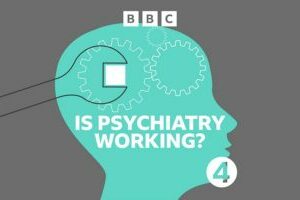From BBC Sounds: “Although psychiatry helped writer Horatio Clare when he was in crisis, some people in difficulty, their families, clinicians, psychologists and psychiatrists themselves will tell you there are serious questions about the ways psychiatry understands and treats people in trouble. And so this series asks a simple question: is psychiatry working? In the following series, accompanied by the psychiatrist Femi Oyebode, Horatio traces a journey through crisis, detention, diagnosis, therapy, and recovery. In this first episode they look at how psychiatry responds to those in crisis.
Chloe Beale, consultant liaison psychiatrist: ‘It’s awful. The demand, certainly in my team, of people needing care is higher than I’ve ever known it. And we don’t have what we need to treat people. We never did have enough of what we needed to help people, but now, half the time I feel like I don’t help anyone at all, these days.
. . . ‘I don’t want to let the profession off lightly by saying it’s all [a matter of] resources because it’s not, it’s deeply ingrained attitudes as well that have been left for a long time. Stigma in the health professions is as much of a problem as it is everywhere else. People talk about the way someone’s acting as being “behavioral,” as like a standalone term. And it means nothing, all behavior’s behavioral, it’s ridiculous. You may as well say breathing is respiratory, you know. You can’t differentiate. But it’s become this term and what we mean is, or what people mean who use it is, this person’s acting out, they’re doing this on purpose. And there’s this real sort of hierarchy that’s developed in the way health professionals can see people with mental health problems or behavioral disturbance or whatever. It’s either, “it’s behavioral,” that it’s volitional, “they know what they’re doing,” we look down on that; or, “they can’t help it.” We, as a profession, as a culture, often view psychosis with a bit more sympathy, because we know that people who are psychotic have effectively lost touch with reality. But at the other end you have people who perhaps have a personality disorder diagnosis. And there’s a tendency to write off the way they’re behaving because they can “help it.” But we have this idea that we can separate it out and then attach a moral judgment to it, and then, accordingly, how worthy we view that of sympathy and of our care and attention. But it helps resolve the cognitive dissonance, if you tell yourself that actually we’re doing the clinically appropriate thing. I think for some people it’s a lot harder to say, I’m sending this patient home because even though they need and deserve a bed, I haven’t got one . . . I think we have these two opposite poles, we have excessive coercion at one end and we have exclusion at the other.'”

***
Back to Around the Web











